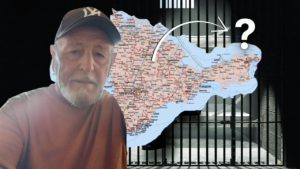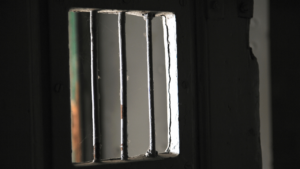Kherson Region Activist Slashes his Wrist after Arrest to Save his Wife from the Russians
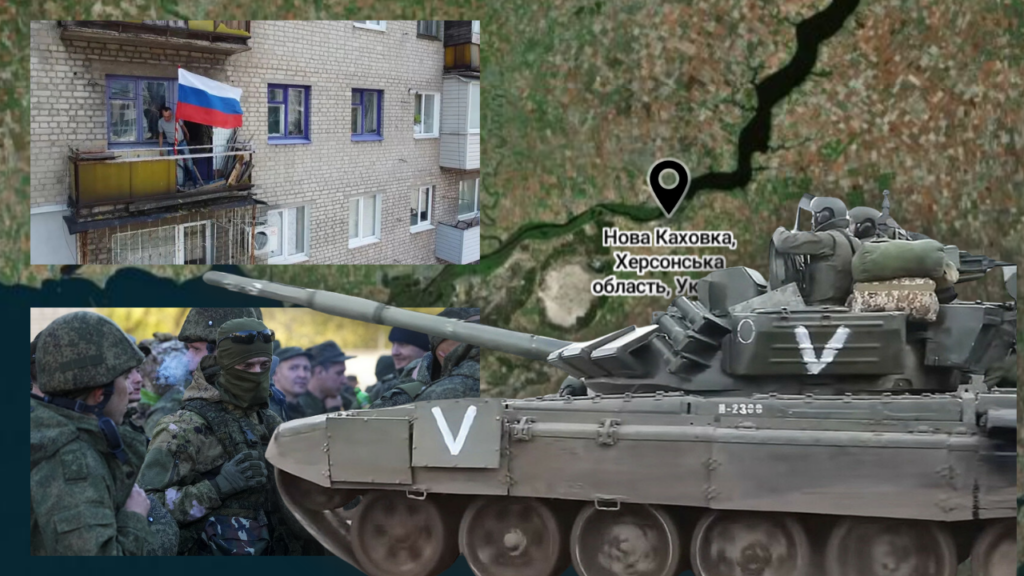
An activist from Nova Kakhovka, Oleksandr (his surname withheld for security reasons), filmed the dismantling of Lenin monuments across the Kherson region before the full-scale invasion. After the occupation began, he became a target for the Russians. He was tortured for two weeks in order to force him to reveal the identities of other civic leaders in the city and to “cooperate” with the occupiers.
The Beginning
On the eve of the full-scale invasion, Oleksandr, an electrician at the municipal water utility in Nova Kakhovka, did not believe that an all-out war was likely. Even on February 23, 2022, while discussing the situation with friends, he once again concluded, “It’ll be fine. Nothing’s going to happen.” But just a few hours later, he heard the first explosions.
“I opened the window and saw the blast, a huge mushroom-shaped cloud. I told my wife, ‘It’s the Russians. The war has started,’” he recalls in a conversation with the MIHR.
Oleksandr and his wife Svitlana decided to go to the water utility building, which had a proper bomb shelter. They also brought along their neighbors — a young couple with two small children.
After a few hours in the shelter, Oleksandr could not sit still. He got on his bicycle and rode toward the Dnipro River to find out what was making the loud rumbling sounds.
“I rode through completely empty streets — not even dogs were out. Just silence, and somewhere beyond the city, heavy machinery roaring. I walked down to the riverbank and saw military vehicles moving, marked with the letter Z,” he said.
At first, he couldn’t figure out who they were. Then he saw the Russian flag on top of the lock tower.
“I felt like throwing up. It was such a shock. You’re standing there, and you just can’t believe your eyes,” Oleksandr recalls.
He quickly returned to the water utility, where he spent several hours in the shelter behind armored doors. By the next morning, Nova Kakhovka was under occupation.
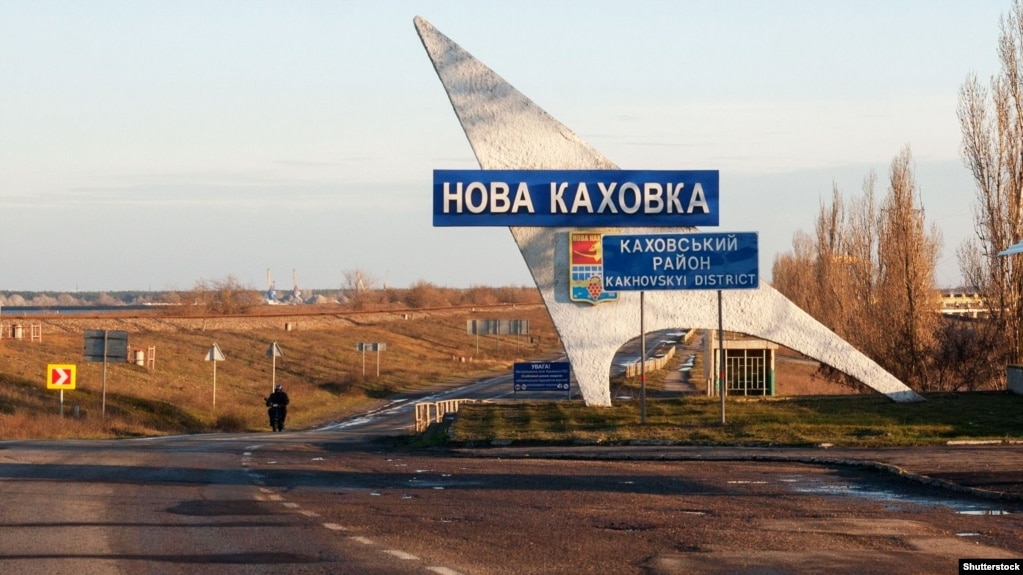
Stela at the entrance to Nova Kakhovka. Photo from open sources
“Bring him here”
In his hometown, Oleksandr was well known for his long record of civic activities. He primarily focused on the issues related to corruption in the community, local self-government, and illegal construction projects. After 2014, together with friends, he also kept an eye on local supporters of the so-called “Russian world” to prevent a repeat of the scenarios that had played out in Donetsk and Luhansk Oblasts.
Still, Oleksandr never imagined that his activities, carried out in independent Ukraine, would become the reason for his arrest by Russian forces during the occupation.
“I’ve heard rumors in town that someone was taken, someone else was held and then released, and that one guy was even sent off somewhere to Simferopol,” says the man. “But I kept thinking: ‘Who am I, really? Just a civic activist — so what? I’m not a politician.’”
He was wrong.
They came for Oleksandr on the morning of April 16, 2022. He and his wife Svitlana were having breakfast in the kitchen.
“I had just taken a bite of my sandwich when I heard noise in the yard,” he says, recalling the timeline of events.
Looking out the window, he saw soldiers armed with assault rifles and heavy vehicles — a URAL truck and an armored personnel carrier. More soldiers stood ready on the other side of the house, positioned beside another APC.
For a few fleeting seconds, Oleksandr clung to the hope that they hadn’t come for him. But then there came a knock on the door. He opened it — and a rifle was immediately pointed at him: “Don’t move or we’ll shoot.”
About eight men entered the apartment (Oleksandr refers to them as Rosgvardiya soldiers in his interview with the MIHR), forced him to the floor, seized his phone, and put handcuffs on him. Oleksandr has long had heart issues, so Svitlana rushed to bring him his medication.
After a quick search of the apartment, one of the Russians called out,
“He’s clean.”
To which another responded,
“Bring him here.”
They let Oleksandr get dressed — moving like in a dream, he pulled on a jacket, laced up his sneakers, and tried to fasten his wristwatch, but his hands were shaking too much to manage it, so he left it. One of the Russians noticed this expensive accessory — he would later return to the apartment and take the watch for himself.
Outside, the soldiers ordered Oleksandr to open his garage.
“They threatened that if they didn’t find weapons or [patriotic] flags, they’d blow up the house, so I’d better confess right away where everything was. I told them I didn’t have anything,” says Oleksandr.
The occupiers found nothing suspicious in the garage. After that, they wrapped duct tape around Oleksandr’s eyes, bound his hands with it and put him into the URAL truck. His memories of what followed are hazy, clouded by the stress of the situation, but one thought kept cutting through the fog: he must remember the way they were driving him. Through a narrow slit in the poorly wrapped tape, Oleksandr could make out a few things: curbs, shadows of trees. He tried to guess the direction to orient himself.
Russian troops entering Kherson Oblast. Footage from social media.
Along the way, the Russians tried to extract information from him — asking about his fellow activists and their home addresses. Oleksandr said nothing. His silence irritated them so much that, at one point, they applied electric shock to his bare lower back. The electric shock knocked him down, but he kept to the task he had set for himself: to track their movements. He counted turns, trying to memorize the route. Several times along the way, he lost consciousness.
Now, looking back, Oleksandr suspects they may have transferred him between vehicles, but he cannot say for sure.
“For some reason, they kept asking me: ‘Are you religious? Were you baptized?’” recalls Oleksandr. “And I told them — I’m an atheist. That’s when they beat me really badly.”
Eventually, the vehicle stopped. At that point, Oleksandr no longer had any idea where he was. He could only hear dogs barking somewhere in the distance.
The Russians sat him down on a tree stump. Someone pulled the bolt on a rifle behind his back. “That’s it, this is the end,” flashed through his mind. “They didn’t get anything out of me — now they’ll shoot me.”
Instead, he heard again:
“Bring him here!”
Even with his eyes taped shut, Oleksandr could tell he was being led into a semibasement room. He sat there for about two hours before a Russian officer entered.
Oleksandr remembers that this one “questioned him kindly” — no threats, no intimidation. The officer promised that no one would hurt him and that they would let him go as soon as he “told them everything.”
But Oleksandr did not give in to the pressure.
“I kept saying I didn’t remember anything, I didn’t know anything,” he tells the MIHR. “They mentioned some call signs, but I have always called my friends by name — I didn’t know any call signs.”
After the questioning, they handcuffed Oleksandr to a radiator.
The room was cold, and he started to shake. A Russian noticed this and assumed he was trembling from fear.
“We’re not going to beat you, don’t be afraid,” the soldier said.
But Oleksandr interpreted that as a threat. He did not believe a word his captors said.
He remained chained to the radiator in that cold room for another four hours.
“They cuffed me so tightly that my hand turned purple. It went completely numb — I still can’t feel this finger,” he says, showing the hand injured by the Russians.
After some time, a soldier came in and offered him some water. Oleksandr finally had a chance to drink and, seizing the moment, asked the soldier to loosen the cuffs.
“Why didn’t you say anything earlier?” the soldier replied in surprise. “Hold on!”
He then completely unfastened the handcuffs.
Later that day, in the evening, Oleksandr was taken out of the building and again was put into a vehicle. This time, he realized that he was being taken back to Nova Kakhovka. The vehicle stopped near the city council building, but they did not take him out. Instead, the interrogation continued right there in the car — the same questions as before. They called him a “Nazi” and a “Right Sector thug”, even though he had no connection to the Right Sector at all.
They mentioned the removal of the monument to Lenin in Beryslav, in Kherson Region. Oleksandr had in fact been there — filming the process with his camera. He had even ended up in the footage himself. He knew there was no point in hiding the fact, so he just told them the truth.
Removal of the Lenin monument in Beryslav, Kherson Region. Video: Ukrainian Life
After the questioning, he was handed over to another group of Russians. He remembers that all of them were dressed in black uniforms.
“They pulled me roughly out of the car. One of them said, ‘Oh, a famous figure,’ and his voice sounded oddly familiar to me. Of course, I was in shock,” the Oleksandr recalls. But he never figured out who the man was.
Tortures
After another drive, Oleksandr was brought into a different basement. He immediately noticed a strong smell of fresh paint, which led him to believe that they had taken him to a recently renovated military base.
“On your knees!” he heard, but he kept standing. The next thing he felt was a powerful blow to the legs — he heard a crack from inside — followed by a heavy strike to the back of his head. Oleksandr lost consciousness.
When he came to, he felt a searing crackling pain in his head — so intense that it made it hard to breathe.
But the occupiers didn’t stop. They resumed the interrogation though they did not expect to hear answers. After each question came another blow. Oleksandr could not hear anything anymore — just the overwhelming crackling noise inside his head.
“I remember him [the Russian interrogator] yelling: ‘Glory to Ukraine! Glory to Ukraine!’ And I couldn’t figure out — was it a question? Why was he shouting that?” Oleksandr recalls fragments of that moment.
Having failed to extract any useful information from him, his torturers escalated their threats. They told him that if he did not start talking, they would bring in his wife and her parents. The last thing he remembered before blacking out completely was a brutal blow to his spine, a burst of pain that pierced straight through him.
He regained consciousness in a small basement cell that measured 2.5 by 1.5 meters. To Oleksandr, it looked like a shower stall, maybe because of the ceramic tiles that covered the walls.
He realized that his hands were free — either the tape had broken as a result of the savage beating, or someone had cut it. He could not see anything, so he began feeling around, trying to orient himself in the dark.
At some point, the door opened, and someone, possibly a guard, asked,
“Do you want the light off, or should I leave it on?”
Because of the blows, the Ukrainian had temporarily lost his vision, and he had not even realized that the light in the room was on. He replied,
“Leave it on. I can’t see it anyway.”
As soon as the door closed, Oleksandr fell asleep.
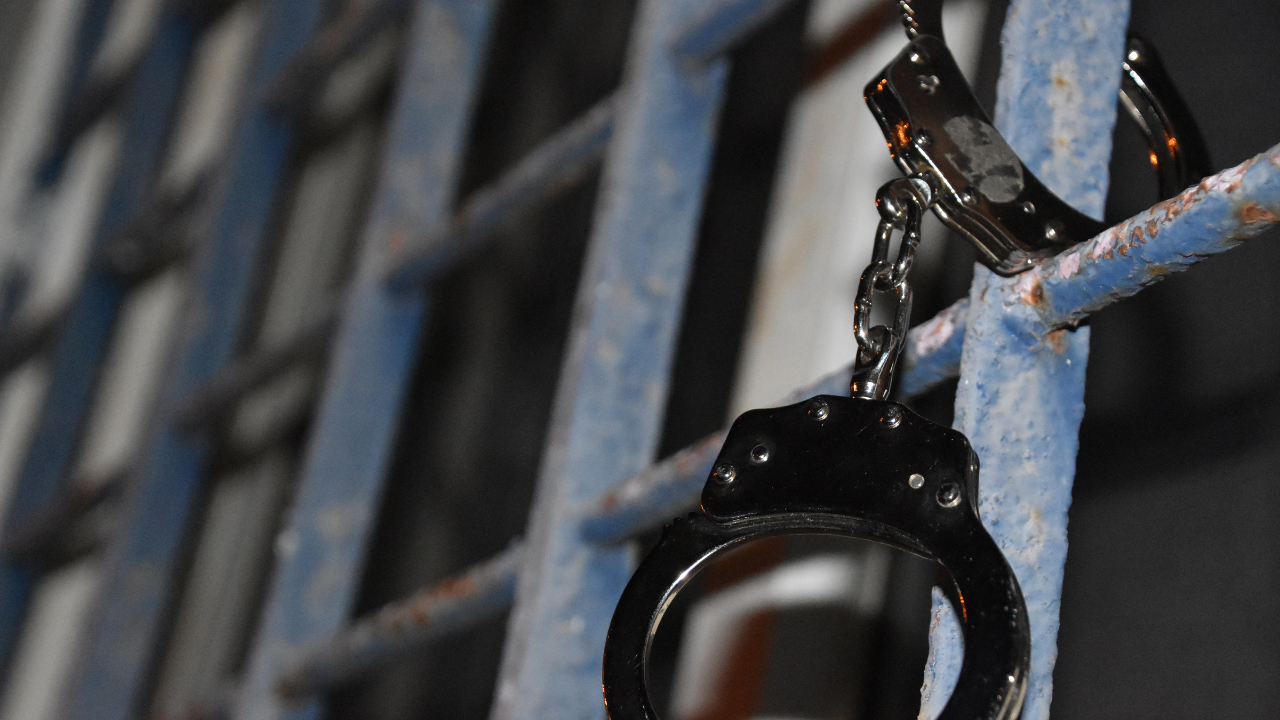
Illustrative photo
When he woke up, he realized that his sight had returned. Even though his eyes were still taped over, he could now tell there was light in the room. Through a small gap in the tape, he could see newly tiled walls with grouted joints. There was a Ukrainian military uniform on the floor. For some reason, he tore a small yellow-and-blue flag patch off one of the jackets and tucked it into his pocket. But then a thought struck him: “If they find it, they’ll kill me.” He pulled it out and put it back.
The Russians’ threat — that they would bring Svitlana here — echoed in his mind. He clearly understood what that meant: either they would torture him in front of her, or they would torture her in front of him. He decided that if he were gone, they would leave his wife alone.
He saw an extension cord on the wall of his cell. He tried to strangle himself with it, but the wire would not tighten. He pulled out a set of keys the Russians had not taken from him, straightened the metal keyring, and jammed it into the power socket — but there was no electricity.
Then, using that same keyring, Oleksandr tore open the veins in his arm. He watched the blood start to flow and became anxious that it would seep under the door and draw the occupiers’ attention.
“I thought that if they came in at that moment and saved me, the next day would be hell. And of course, it just wasn’t right. So I started drinking the blood to keep it from spreading,” Oleksandr admits.
He filled the gap under the door with his clothes. His body grew so weak that he was no longer able to lift his arm. Oleksandr lay there on the floor, feeling the blood draining from his body.
“They’ll come for you”
Oleksandr regained consciousness in a hospital. Based on what people were saying, he understood that he had been brought to the intensive care unit and that his arm had been stitched up.
“I’m a blood donor, actually,” he explains to the MIPL. “The doctor told me I probably survived because my body had already been prepared.”
Oleksandr was shivering from the cold, so a nurse covered him with several blankets to keep him warm.
He remembers the doctor leaning over him and saying,
“They’ll come for you in the morning anyway.”
And that is exactly what happened — two guards were sent to the hospital to bring Oleksandr back. This time, they did not bother blindfolding him or tying his hands, so he could see that he was being taken to the local police department that was under Russian control.
He was led to an office on the second floor and handcuffed to a radiator. Later, they told him that the keys had been lost, so he remained there for more than two weeks. Throughout that time, Oleksandr continued to be interrogated, though due to his critical condition, he was no longer beaten.
He suffered from unbearable headaches and constant dizziness. His chest burned — his heart was giving him trouble too.
Eventually, they found the keys, and he was finally allowed to use the toilet, though his legs barely worked.
One day, while sitting by the window where he was chained, he saw the silhouette of a woman. He thought he recognized Svitlana. His guard noticed him staring.
“Sania,” the Russian said familiarly, “what are you staring at over there?”
“A woman walked by. She looked like my wife,” he replied.
“Well, who do you think has been bringing you the care packages?” the guard said, chuckling.
“What care packages?” Oleksandr asked, surprised.
“Right there on the windowsill — hose bags.”
No one had told him about any packages, and he had not noticed the bags. He looked over — inside were home clothes that only Svitlana could have brought, along with some food. From that moment, Oleksandr did not take his eyes off the window. Not long after, he saw Svitlana leaving the building with her mother.
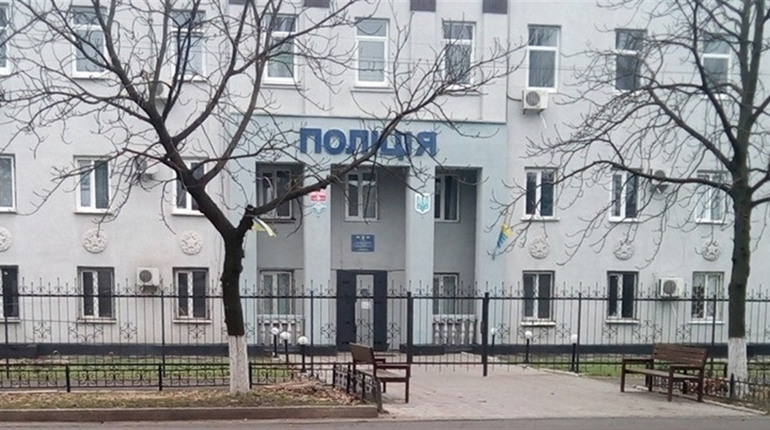
The Nova Kakhovka Police Department where Ukrainians are tortured by Russians. Source: NovaKahovka.City
Later, she managed to send him a short note, telling him he would soon become a grandfather.
That evening, as he was escorted to the bathroom, Oleksandr collapsed again — his heart was failing. The guards simply left him lying on the floor. He could feel his fingers go numb, his tongue stiffen. He lay there for about two hours.
“One of the Russians came over and started poking my finger with a knife,” the Ukrainian recalls his last day in captivity. “He said it should help.”
Eventually, they lifted him onto two pushed-together desks and placed a sweater under his head. Gradually, he began to feel better.
In the morning, an FSB officer in a black uniform with a rifle slung over his back came to see him. He informed that Oleksandr would be released provided that he recorded a video where he should say that he did not love Ukraine. Having no other choice, Alexander agreed.
“So, how do you feel about our presence here?” they asked during the recording.
“I just hope the city won’t be harmed and people are left alone,” he responded, trying to say as little as possible.
Oleksandr believes that the Russians decided to release him because they were desperate to improve their image among local residents, to demonstrate that they were not causing troubles to civilians.
Before letting him go, they made him sign some documents. He did not even read them. He only remembers that one was a written promise not to leave the area.
“They wanted to keep me on a leash,” he explains, “so I’d report everything to them.” “They also said that if I tried to leave, they’d ‘kill me’ at the checkpoint.”
He was ordered to report to the police station every day for a week. Oleksandr barely remembers the moment he finally got outside. It was April 30. He had spent two weeks in captivity.
Escape
For another three weeks, Oleksandr continued to report to the police station as ordered: the officer on duty would hand him a slip of paper where he would sign his name.
But the next time when he showed up at the building’s entrance, he was met by a group of unfamiliar Russians. It turned out there had been a rotation — new troops had arrived in Nova Kakhovka.
“Who are you? What are you doing here?” they snapped at him.
Oleksandr explained his situation.
“Don’t come back. Forget this place completely,” they ordered him.
He understood it was time to get out of the city, but he was anxious about his pledge not to leave and the Russians’ threat to shoot him at the checkpoint. However, Svitlana kept urging him to go, assuring him that no one would ask questions at the checkpoints — they just had to try. Eventually, he made up his mind.
The couple packed their things and chose their departure date: July 12. They were lucky. The night before, the Ukrainian Armed Forces had struck Russian positions in Nova Kakhovka, causing panic among the occupiers. That morning, Oleksandr and his wife passed through the checkpoints without problems — the enemy was busy dealing with the aftermath of the strike, and no one paid attention to the couple in their old Tavriia car.
The next four days were spent on the road — the queues at the checkpoints in Zaporizhzhia Oblast seemed endless. The Russians asked Oleksandr almost nothing. But there were consequences of his two-week captivity: Oleksandr still felt dizzy constantly. In order to appear normal and avoid drawing attention, he took handfuls of sedative drugs. He told his wife, “If they detain me on the road, say you don’t know me. Get into another car and keep going.”
There was a grey zone past Vasylivka — the road they traveled was flanked by minefields. When Oleksandr finally saw Ukrainian flags again, it felt like a weight had been lifted off his chest. They spent the night in Zaporizhzhia, then continued on to Odesa, where they have lived ever since.
After the tortures, Oleksandr developed serious sleep problems. Once they reached the government-controlled territory, he sought help from psychologists. He also underwent heart surgery, but the attacks still come.
The high-pitched ringing in his head, a result of the concussion, has not gone away either. It is particularly unbearable in the mornings. Doctors warned that it would be extremely difficult to get rid of it. But Oleksandr found his own way of dealing with his problem: he listens to music through headphones to distract himself.
Author: Yevheniia Korolova
This article was published with the support from the European Endowment for Democracy (EED). Its content does not necessarily reflect the official position of the EED. The views or opinions expressed herein are the sole responsibility of the author(s).



